-
Posts
148 -
Joined
-
Last visited
Content Type
Profiles
Forums
Events
Posts posted by Apwu133
-
-
Web News Article #: 14-2019
On Feb. 13, Sen. Bernie Sanders (I-VT) introduced S. 478, the “Expand Social Security Act,” legislation that would expand benefits and add almost 50 years of solvency to the program. Social Security, in its current form, is paying out more money to recipients than it takes in, and will no longer be able to pay out full benefits by 2034. A companion bill, H.R. 1170 was introduced in the House on the same day by Rep. Peter DeFazio (D-OR-4).
-
Web News Article #: 15-2019
On Feb. 15, 2019, the APWU National Executive Board adopted a proclamation honoring women of the APWU throughout March, in celebration of Women's History Month.
The proclamation read:
-
Web News Article #: 13-2019
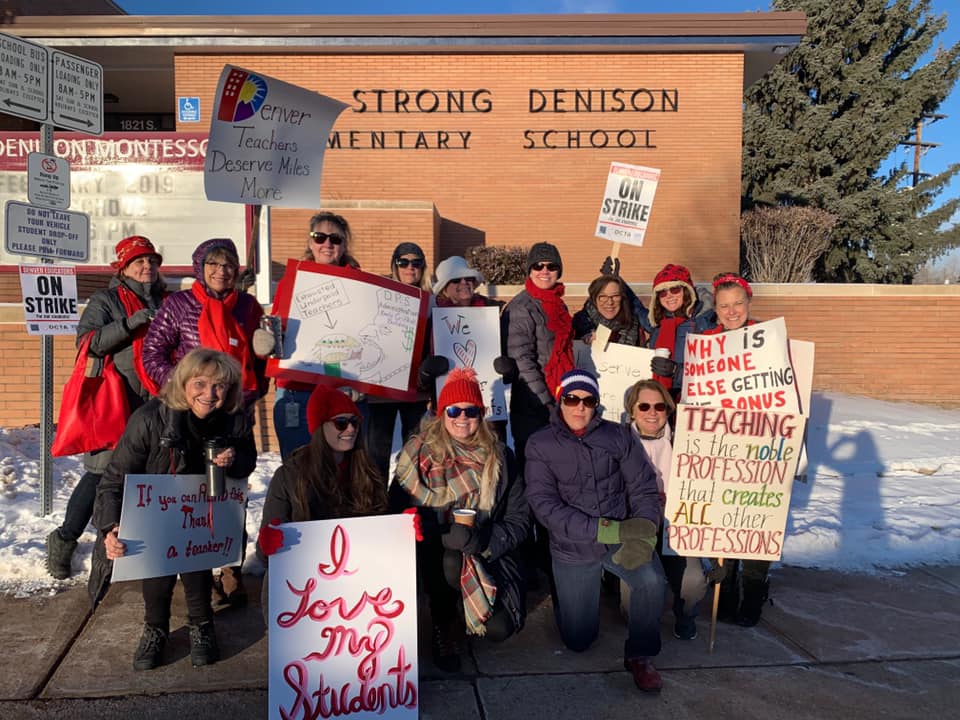 On Monday, Feb. 11, over two thousand educators from the Denver Classroom Teachers Association (DCTA) walked out of school, launching the first teachers’ strike in the city in over 25 years. The walkout follows 15 months of negotiations. The strike vote passed in January with over 93 percent of the workers in favor of the walkout.
On Monday, Feb. 11, over two thousand educators from the Denver Classroom Teachers Association (DCTA) walked out of school, launching the first teachers’ strike in the city in over 25 years. The walkout follows 15 months of negotiations. The strike vote passed in January with over 93 percent of the workers in favor of the walkout.
The APWU National encourages members who are able to join the picket lines or show their support via social media with the hashtag #DCTAstrong. You can also donate to the strike fund.
-
Web News Article #: 246-2016
Consistent with the requirements of the Wounded Warriors Federal Leave Act of 2015, the Postal Service allows veteran employees who meet the eligibility requirements to take Wounded Warrior Leave. This is a specific type of leave, which provides veteran employees with no loss in pay, for undergoing medical treatment for a service-related disability rated at 30% or more.
-
Web News Article #: 12-2019
 On Feb. 5, Secretary-Treasurer Elizabeth “Liz” Powell was honored by the World Peace Prize Awarding Council (WPPAC) as a “Roving Ambassador for Peace,” and awarded the World Peace Prize for Labor Leadership, alongside Ester Lopez, International Secretary-Treasurer, UFCW.
On Feb. 5, Secretary-Treasurer Elizabeth “Liz” Powell was honored by the World Peace Prize Awarding Council (WPPAC) as a “Roving Ambassador for Peace,” and awarded the World Peace Prize for Labor Leadership, alongside Ester Lopez, International Secretary-Treasurer, UFCW.
-
Web News Article #: 11-2019
APWU Regional Safety and Health Representatives, Regional Coordinators, and National Officers responsible for the flow of workplace safety programs recently met over two days at headquarters, where they discussed APWU’s Stand Up for Safe Jobs campaign and prepared to go into the field to present training on the campaign, and safety in general.
Each APWU region has at least one member in the field, a Safety and Health Representative, who is appointed to help states and locals with safety issues that affect workers.
-
Web News Article #: 11-2019
APWU officers at the 2019 Women's March in Washington, DC. -
Web News Article #: 10-2019
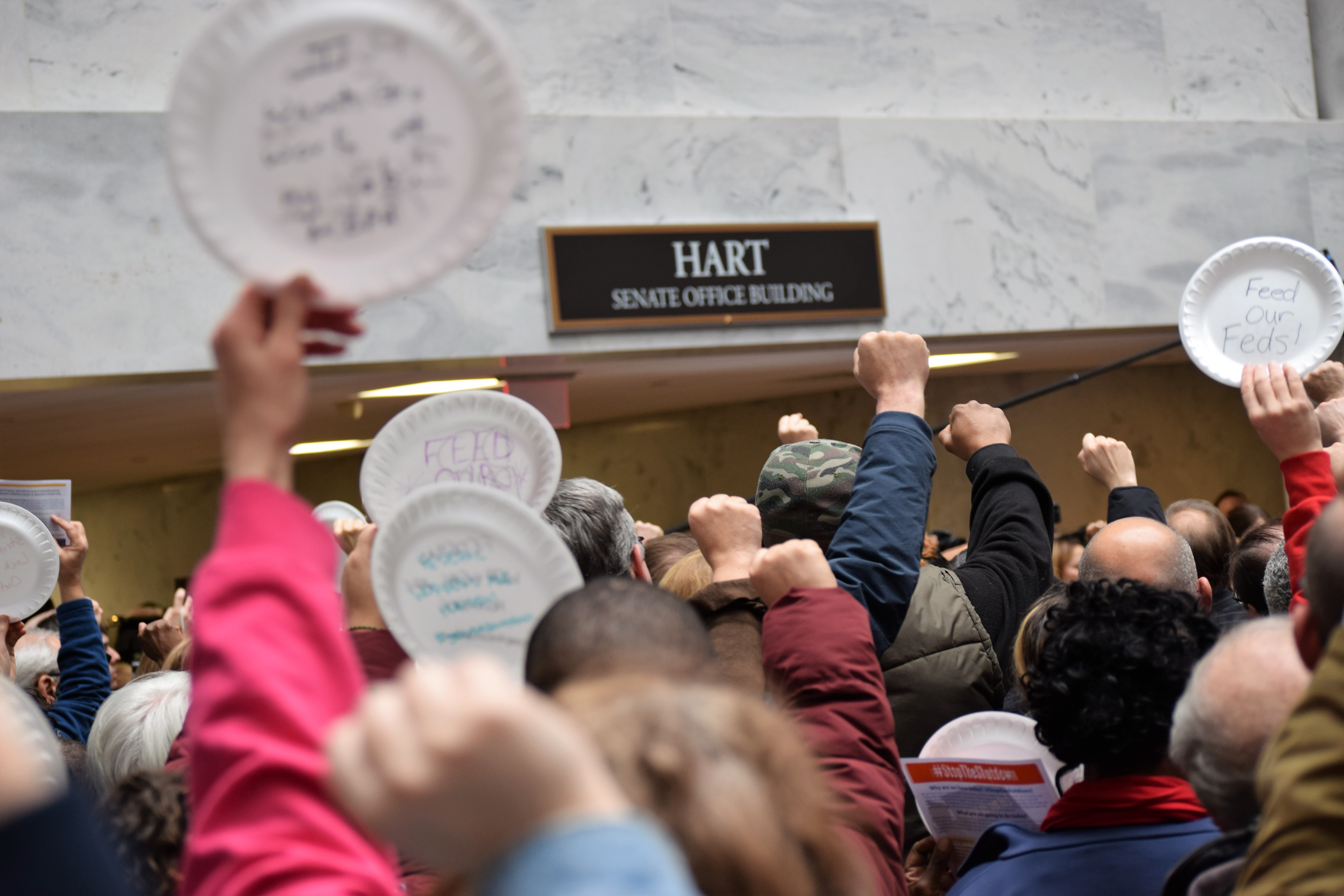 On Jan. 23, APWU officers joined together with protestors from the American Federation of Government Employees (AFGE), National Federation of Federal Employees (NFFE), SEIU, and other unions in a sit-in at the Hart Senate office building in Washington, D.C., demanding the re-opening of the federal government.
On Jan. 23, APWU officers joined together with protestors from the American Federation of Government Employees (AFGE), National Federation of Federal Employees (NFFE), SEIU, and other unions in a sit-in at the Hart Senate office building in Washington, D.C., demanding the re-opening of the federal government.
Hundreds of protestors engaged in a silent, 33-minute sit-in action (one minute for each day of the shutdown).
-
Web News Article #: 9-2019
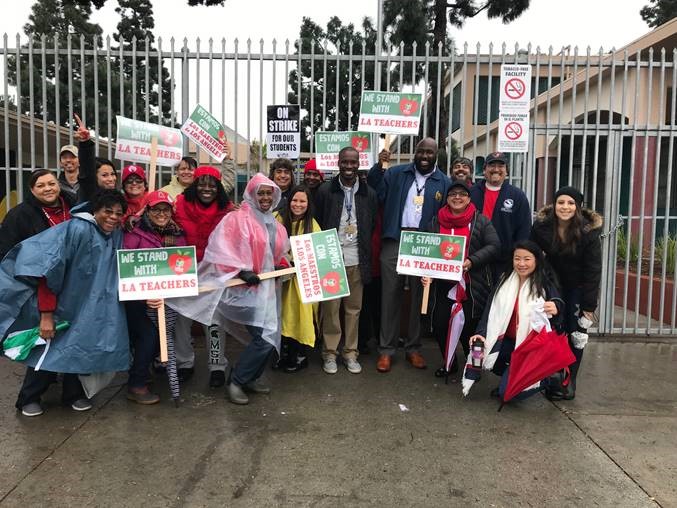 APWU’s Greater Los Angeles Area Local joined United Teachers Los Angeles (UTLA) on the picket line last week, offering support to fellow public-sector workers during the week-long strike that ended Tuesday morning.
APWU’s Greater Los Angeles Area Local joined United Teachers Los Angeles (UTLA) on the picket line last week, offering support to fellow public-sector workers during the week-long strike that ended Tuesday morning.
“It’s important to support each other in solidarity,” said Greater Los Angeles Area Local President Dominic Davis. “Teachers were out in full force, side by side with us in solidarity, during the Stop Staples campaign. We’re so closely aligned with them, with both of us going through negotiations [now], so it was important to show our support.”
-
Web News Article #: 8-2019
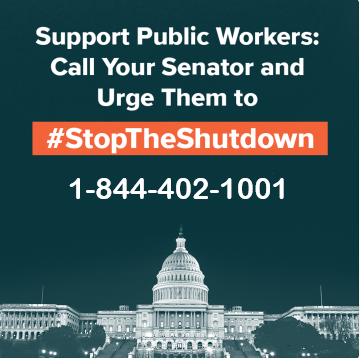
The United States is in the midst of the longest government shutdown – with 800,000 government employees locked out of their jobs. Thousands are currently forced to work without pay. Make no mistake: federal employees’ pay is being held hostage as the White House and Congress lock horns over federal funding.
President Mark Dimondstein is asking APWU members to contact their Senators, telling them that they shouldn’t use federal employees’ pay as a bargaining tool over policy issues.
-
Web News Article #: 7-2019
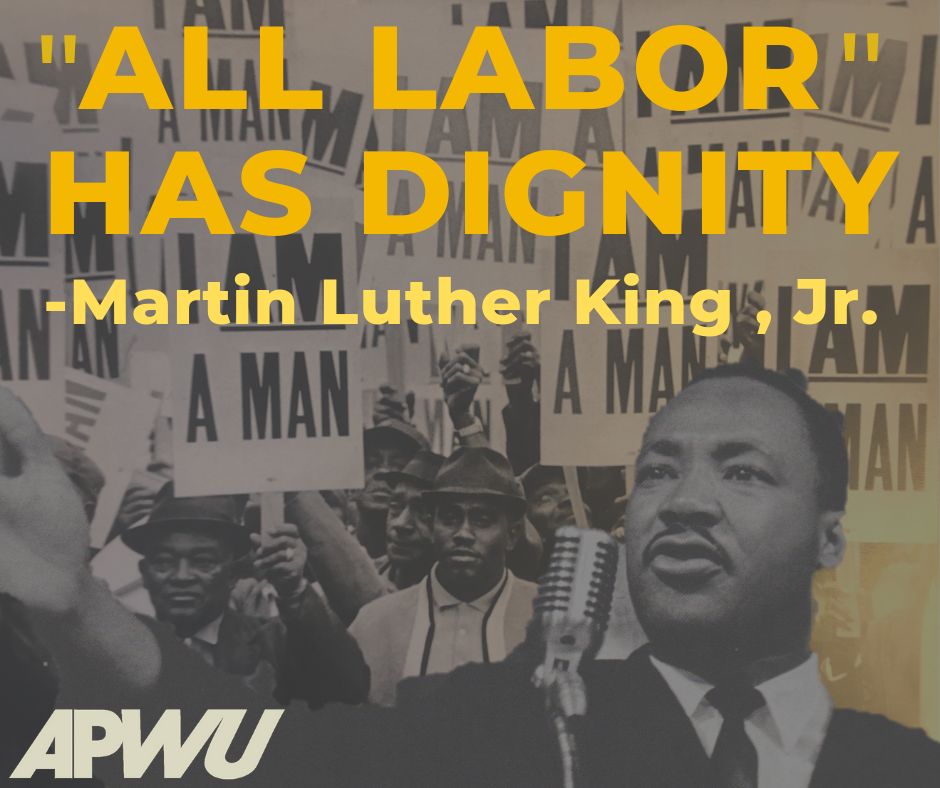 The APWU joins the country today in honoring Dr. Martin Luther King Jr., a dedicated champion for the civil rights and labor movements. Dr. King’s actions still resonate in the hearts of labor and civil rights activists.
The APWU joins the country today in honoring Dr. Martin Luther King Jr., a dedicated champion for the civil rights and labor movements. Dr. King’s actions still resonate in the hearts of labor and civil rights activists.
-
Web News Article #: 6-2019
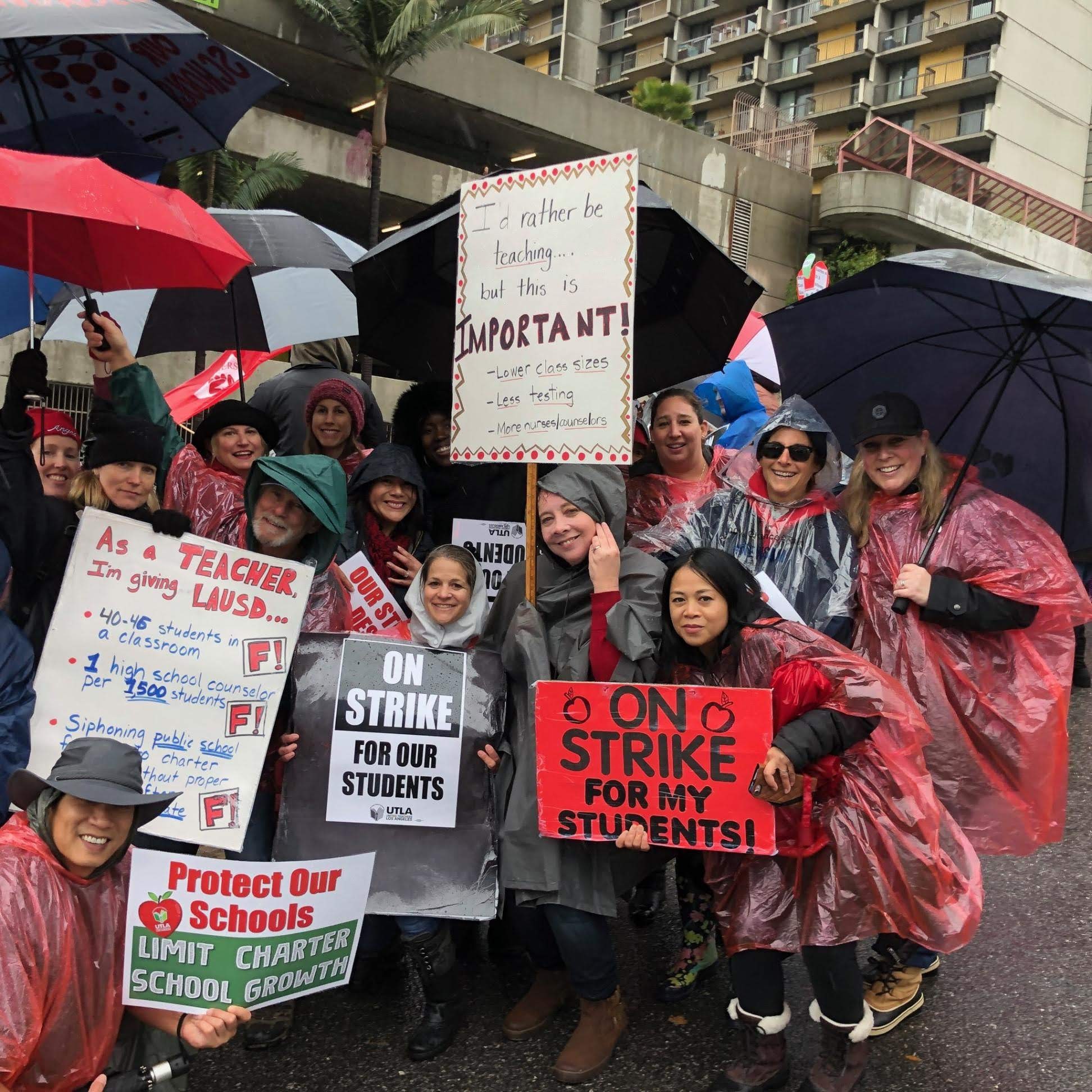 On Monday, Jan. 14, over 30,000 members of the United Teachers Los Angeles (UTLA) walked out on strike, taking to the streets in a driving rainstorm. The strike against the Los Angeles Unified School District (LAUSD) comes after their 21 month-long contract negotiation reached an impasse.
On Monday, Jan. 14, over 30,000 members of the United Teachers Los Angeles (UTLA) walked out on strike, taking to the streets in a driving rainstorm. The strike against the Los Angeles Unified School District (LAUSD) comes after their 21 month-long contract negotiation reached an impasse.
The education workers are demanding: reasonable class sizes; an instant 6.5 percent pay increase; more nurses, librarians, psychiatrists and counselors to fully staff all district schools; and limits on funding to charter schools (a form of education privatization – turning schools into profit making and driven entities).
-
(This article first appeared in the January/February 2019 issue of the American Postal Worker magazine)
By Health Plan Director John Marcotte
-
(This article first appeared in the January/February 2019 issue of the American Postal Worker magazine)
By Retirees Department Director Nancy Olumekor
When you receive a “cold call” from a federal agency – like the Social Security Administration, the IRS, or the Office of Personnel Management (OPM) – it is a fraud call. A “cold call” is an unsolicited call from someone that you did not call, which may include a voicemail to call them back. Cold callers identifying themselves as being from a government agency are committing fraud – they are attempting to get your personal identifying information, such as your social security number, your bank account information, your CSA (Civil Service Annuity) number or your credit
card information. -
This article first appeared in the January/February 2019 issue of the American Postal Worker magazine)
By Research & Education Department Director Joyce B. Robinson
According to figures released by the Bureau of Labor Statistics, membership in labor unions rose by about a quarter million this year. In 2017, 7.2 million employees in the public sector belonged to a union, compared with 7.6 million workers in the private sector. Although the union membership rate for private-sector workers increased by 0.1 percent, their unionization rate continued to be lower than that for public-sector workers (6.5 percent versus 34.4 percent).
-
(This article first appeared in the January/February 2019 issue of the American Postal Worker magazine)
By Human Relations Director Sue Carney
Martin Luther King referred to the Civil Rights Act of 1964 as the second emancipation. It ended public segregation, banned employment discrimination, and forbids the use of federal funds for discriminatory programs.
-
(This article first appeared in the January/February 2019 issue of The American Postal Worker magazine)
The Veterans Administration Maintaining Systems and Strengthening Integrated Outside Networks Act was signed into law on June 6, 2018. Dubbed the VA MISSION Act, the “reform” was touted to improve veteran access to VA health care and pave the way for a major overhaul of the Department of Veterans Affairs (VA), which has long been plagued with problems that negatively impact our veterans.
Critics, however, see the act as an effort to privatize the VA. If you look at the fine print, they just might be right.
-
(This article first appeared in the January/February 2019 issue of the American Postal Worker magazine)
By MVS Division Director Michael O. Foster
In a significant change to Department of Transportation (DOT) rules, the Federal Motor Carrier Safety Administration (FMCSA) has issued a revision to the policy on insulin dependent diabetics operating Commercial Motor Vehicles, 49 CFR Part 391 [Docket No. FMCSA -2005-23151].
-
(This article first appeared in the January/February 2019 issue of the American Postal Worker magazine)
By Southern Region Coordinator Kennith Beasley
I trust that all APWU members had a Happy Holiday Season and New Year.
During 2018 we had countless things to be grateful for. We are still standing in spite of the White House’s unnecessary, unwarranted attacks on the Postal Service. Our challenge now in 2019 is to stay focused on strengthening our resolve to continue to safeguard and protect the public Postal Service and our jobs.
We were excited and energized in 2018. Let us carry that same enthusiasm over into 2019
-
(This article first appeared in the January/February 2019 issue of the American Postal Worker magazine)
By MVS Division Director Michael O. Foster
In a significant change to Department of Transportation (DOT) rules, the Federal Motor Carrier Safety Administration (FMCSA) has issued a revision to the policy on insulin dependent diabetics operating Commercial Motor Vehicles, 49 CFR Part 391 [Docket No. FMCSA -2005-23151].
-
(This article first appeared in the January/February 2019 issue of the American Postal Worker magazine)
By Southern Region Coordinator Kennith Beasley
I trust that all APWU members had a Happy Holiday Season and New Year.
During 2018 we had countless things to be grateful for. We are still standing in spite of the White House’s unnecessary, unwarranted attacks on the Postal Service. Our challenge now in 2019 is to stay focused on strengthening our resolve to continue to safeguard and protect the public Postal Service and our jobs.
We were excited and energized in 2018. Let us carry that same enthusiasm over into 2019
-
(This article first appeared in the January/February 2019 issue of the American Postal Worker magazine)
By Maintenance Division Director Idowu Balogun
A staffing review is an important tool for protecting Maintenance Craft jobs, and we encourage locals to request reviews if there is a valid reason to believe that your office is understaffed under TL 3 or TL 5. Staffing packages in the Maintenance Division can be broken into two general categories: custodial staffing and mechanized staffing.
-
(This article first appeared in the January/February 2019 issue of the American Postal Worker magazine)
By Maintenance Division Director Idowu Balogun
A staffing review is an important tool for protecting Maintenance Craft jobs, and we encourage locals to request reviews if there is a valid reason to believe that your office is understaffed under TL 3 or TL 5. Staffing packages in the Maintenance Division can be broken into two general categories: custodial staffing and mechanized staffing.
-
(This article first appeared in the January/February 2019 issue of the American Postal Worker magazine)
By Clerk Division Director Clint Burelson
Are you tired of management knowingly and willfully violating the contract, providing poor service to the public and otherwise doing whatever they want? There are many ways to fight back and one way is on-the-clock. By utilizing the grievance procedure, you can get paid for improving the Postal Service while you are at work.

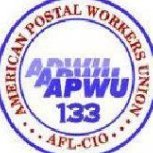
West Virginia Teachers Strike and Win Again
in National News
Posted
On Feb. 19, almost a year after walking out of school and beginning a national movement of teacher and education workers strikes across the country, West Virginia workers struck again. This time teachers and school personnel walked out explicitly in protest against a potential bill that would begin a process to privatize the state’s education system. Schools in 54 of the state’s 55 counties were closed for the day, and the House of Delegates voted 53-45 to kill the bill only hours after the walk out.
View the full article